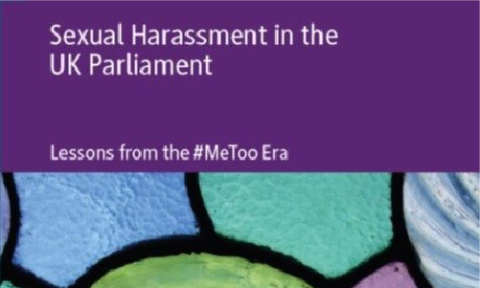New book on Sexual Harassment in the UK Parliament: Lessons from the #MeToo Era

By Christina Julios
My new book Sexual Harassment in the UK Parliament explores the widespread phenomenon of sexual misconduct at the core of Britain’s political establishment, as well as public policy efforts to tackle the problem. Drawing on an intersectional feminist perspective and academic literature on Violence Against Women in Politics (VAWP), the volume examines the plight of female victims of sexual transgressions in Westminster. In exploring gender power dynamics in the parliamentary workplace, the book unveils entrenched misogynistic attitudes together with social structures and system of subordination that continue to disadvantage women. These include factors such as gender, ethnicity, social class, patriarchal cultures, institutionalised gender inequality and sexism. With countless accounts by survivors of alleged workplace sexual offences in parliament and its devolved institutions, the unequal status of women working in such male-dominated environment is critically examined.
Britain’s experience is viewed within the wider context of the global #MeToo movement and the infamous Hollywood sex scandal involving former film tycoon Harvey Weinstein, in 2017. At the time, The New York Times and The New Yorker’s exposés of Weinstein’s serial offending against women within the film industry galvanised the collective voices of victims and survivors of workplace sexual offences everywhere, under the #MeToo campaign. In the wake of #MeToo, it was only a matter of time before allegations of sexual harassment levelled against UK MPs by female politicians, activists and staff came to light. In line with Hollywood’s movie industry and innumerable institutions worldwide, sexual misconduct in the realm of British politics proved endemic. Such behaviour cut across the political spectrum, with MPs from every political persuasion standing publicly accused of wrongdoing. A string of public apologies, suspensions, dismissals and resignations by offending parliamentarians was to follow. The book chronicles these events and their far-reaching impact on relevant public policy, legislation and organisational practices. The volume also considers persistent institutional barriers to eradicating workplace sexual harassment, reporting of cases and the silencing of victims.
In heeding the lessons from the #MeToo era, the book suggests ways to redress the status quo and challenges ahead, including four key areas for action. First, addressing the gender power gap that continues to disadvantage women in workplaces all over, while privileging men. Second, tackling a corporate culture of complicity that discourages victims of sexual transgressions from reporting cases at work, whilst enabling perpetrators to get away with their actions. Third, outlawing the misuse of Non-Disclosure Agreements (NDAs) that silence those subjected to sexual offences, but fail to hold offenders accountable for their deeds. Finally, the need to eliminate the ‘fear factor’ that prevents victims and whistle-blowers from seeking justice, as they are forced to carefully consider the potential costs that exposing workplace misconduct may have on their personal and professional lives.
In order to map out the nature and extent of sexual harassment in the Houses of Parliament, the book’s methodology comprises content analysis of a wide range of relevant sources. These include: official publications, parliamentary debates, legislation, academic research and grey literature, autobiographical accounts, films, documentaries and online social media. By exploring the issue of workplace sexual misconduct through such an array of narratives, Sexual Harassment in the UK Parliament is able to illustrate the complex and multi-layered nature of this intractable social problem. Moreover, as the first scholarly study of its kind, the book ultimately raises serious questions about the prevailing gender power dynamics in Westminster and the shared challenges faced by many women in the wider workplace.
Sexual Harassment in the UK Parliament: Lessons from the #MeToo Era is now available on Palgrave Macmillan/Springer’s website.
Dr Christina Julios is an Honorary Associate and Assoc. Lecturer at The Open University. She is the author of the books: Female Genital Mutilation and Social Media (2019); Forced Marriage and ‘Honour’ Killings in Britain (2015); and Contemporary British Identity (2008).
